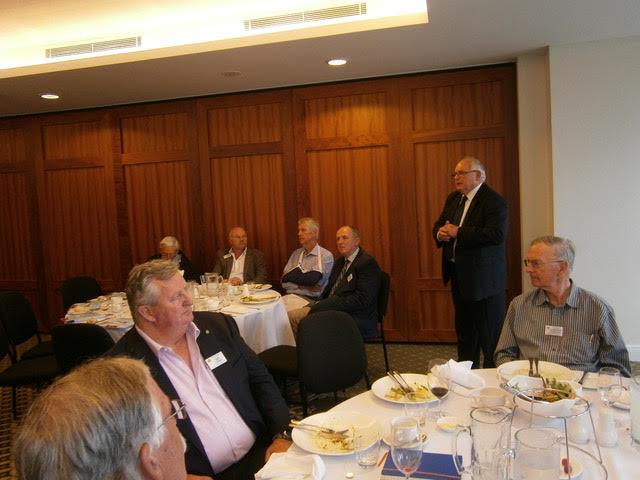Bob Slater....Ethical Leadership
Posted on Nov 22, 2016

Bob Slater is president at Kew Rotary. His told of his observations on aspects of ethics, and the interplay with leadership. Ethical Leadership he termed it. That's Bob above rejecting the podium to talk from the floor.
Bob has a background in the military, and engineering and the management of charitable foundations. He recalled his interest in the topic arose when interacting with some year 12 students. The issue was to guide them with options to combat unethical behavior and pressure from others to do something less than the "right thing".
Thus he took us through a series of historical commentaries and definitions on this highly philosophical area and left us realizing that there is no unique correct approach.
Bob started by explaining the concepts of Legal, Ethical and Moral practice.
The intriguing and intangible nature of ethics has existed for centuries. It is an enduring but dynamic set of behavioral principles. It can be contrasted with clear legal rules established by the state, and obligations of business stewardship to look after shareholder interests first.
How does morality fit into this? Yet again it is an abstract area but perhaps best defined as the behavioral standards of society --- indeed this varies with time in the same society and at any instant differs between societies. That is a problem as one observes with conflicts, between the rights of one as against the organisation, religion and even needs to fight wars.
The idea of good ethical leadership arose. British WWII leader Montgomery said “leadership is the capacity and will to rally men and women to a common purpose and the character which inspires confidence.”
Bob started by explaining the concepts of Legal, Ethical and Moral practice.
The intriguing and intangible nature of ethics has existed for centuries. It is an enduring but dynamic set of behavioral principles. It can be contrasted with clear legal rules established by the state, and obligations of business stewardship to look after shareholder interests first.
How does morality fit into this? Yet again it is an abstract area but perhaps best defined as the behavioral standards of society ---indeed this varies with time in the same society and at any instant differs between societies. That is a problem as one observes with conflicts, between the rights of one as against the organisation, religion and even needs to fight wars.
The idea of good ethical leadership arose. British WWII leader Montgomery said “leadership is the capacity and will to rally men and women to a common purpose and the character which inspires confidence.”
Bob explored the reference to confidence. What’s that? He cataloged the characteristics of one who is confident as perceived by a modern psychologist Travis Bradberry. These included aspects of risk taking, self-contentment, capacity to admit error, listening, being non- judgmental and assertiveness.
It was a thought provoking address by Bob. It certainly condensed the audiences thoughts about ethical behavior and good leadership. Ultimately however it reinforced the clarity and quality of the Rotary Four Way Test.
We are reminded that the Four-Way Test is a nonpartisan and non- sectarian ethical guide for Rotarians to use for their personal and professional relationships. The test has been translated into more than 100 languages, and Rotarians recite it at club meetings:
Is it the TRUTH?
Is it FAIR to all concerned?
Will it build GOODWILL and BETTER FRIENDSHIPS?
Will it be BENEFICIAL to all concerned?
Is it FAIR to all concerned?
Will it build GOODWILL and BETTER FRIENDSHIPS?
Will it be BENEFICIAL to all concerned?
Bob explored the reference to confidence. What’s that? He cataloged the characteristics of one who is confident as perceived by a modern psychologist Travis Bradberry. These included aspects of risk taking, self-contentment, capacity to admit error, listening, being non- judgmental and assertiveness.
It was a thought provoking address by Bob. It certainly condensed the audiences thoughts about ethical behavior and good leadership. Ultimately however it reinforced the clarity and quality of the Rotary Four Way Test.
We are reminded that the Four-Way Test is a nonpartisan and non- sectarian ethical guide for Rotarians to use for their personal and professional relationships. The test has been translated into more than 100 languages, and Rotarians recite it at club meetings:
- Is it the TRUTH?
- Is it FAIR to all concerned?
- Will it build GOODWILL and BETTER FRIENDSHIPS?
- Will it be BENEFICIAL to all concerned?